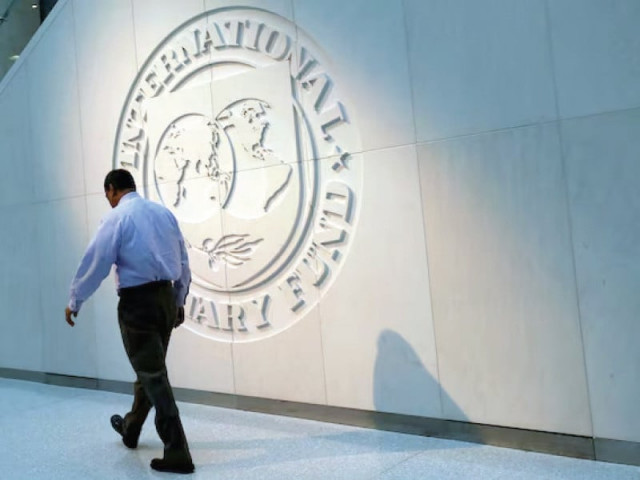Govt defies IMF call for withdrawal of Rs749b tax exemptions
Senate panel told govt only proposed withdrawing Rs337b in budget

As the government faces political pressure to retain the sales tax exemptions worth over Rs90 billion that were proposed to be withdrawn in the budget, the Federal Board of Revenue on Saturday said the International Monetary Fund (IMF) had asked the country to abolish those amounting to Rs749 billion.
Against the global lender’s demand to erase Rs749 billion worth of sales tax exemptions, the government proposed withdrawing only those totalling to Rs337 billion in the budget, said FBR sales tax chief Fakhriya Anjum while speaking during the Senate Standing Committee on Finance’s meeting.
She did not explain whether the IMF was satisfied with the government’s decision to withdraw only Rs337 billion in sales tax exemptions or more measures had to be taken to meet its demand.
During the post-budget news conference, Finance Minister Muhammad Aurangzeb had refused to respond when asked if he would categorically guarantee that no mini-budget would be introduced after the massive Rs1.5 trillion in new taxation proposed for the next fiscal year.
The government on Saturday drew the ire of the senators belonging to both the ruling PML-N and PPP for imposing taxes on “an infant’s milk” to “children’s education materials” as well as “professionals’ computers”.
It remained unable to defend its taxation proposals and ended up giving illogical justifications.
“The 18% GST [general sales tax] has been imposed on infant milk to promote breastfeeding in the country,” Amina Faez Bhatti, the FBR Member Inland Revenue Policy, told the Senate panel.
PPP Senator Sherry Rehman told her that it was not the FBR’s job to promote breastfeeding.
Equally scathing in her criticism, PML-N Senator Anusha Rehman told the FBR officials that they were snatching away milk from newborn babies.
Fakhriya informed the Senate panel that it was a precondition by the IMF to withdraw Rs749 billion in sales tax exemptions for entering into a new programme.
However, she added that the government had only proposed withdrawing sales tax exemptions worth Rs337 billion.
For the next fiscal year, the government has set the FBR’s target at Rs12.97 trillion and to achieve it proposed Rs1.5 trillion in new taxes.
Sources said the government was facing pressure to retain at least Rs90 billion in sales tax exemptions on Khyber-Pakhtunkhwa’s tribal districts as well as agricultural inputs.
In case it retains these exemptions, the government will have to either tax some other areas or reduce expenditures.
PPP Senator Farooq H Naek, a former law minister, said it was an IMF budget and could not be called one prepared by the government.
The members of the committee expressed their dissatisfaction with the taxes on stationery and essential daily items.
They particularly objected to the taxes proposed on infant milk, arguing they were burdening the parents of newborns.
The Senate panel criticised the budget proposed for the next fiscal year, saying that it appeared more aligned with the IMF’s priorities than those of national interests.
They senators expressed concerns that the proposed budget disproportionately taxed the poor, needy, and vulnerable.
The committee strongly opposed the taxes on stationery items including colouring and regular pencils as well as geometry sets.
It characterised the budget proposed for 2024-25 as excessively burdened with taxes -- especially the 18% GST on every item, further inflating the cost of living and diminishing public morale.
Senator Anusha highlighted concerns over the taxation of medical equipment, emphasising the impact on healthcare costs including endoscopy, oncology, urology, gynecology, and disposable items.
The committee also questioned the basis for granting tax exemptions to certain charitable hospitals, with the FBR clarifying that the Pakistan Centre for Philanthropy (PCP) was authorised to do so.
The committee further recommended subjecting donated goods to hospitals operated by non-profit institutions to similar customs duty conditions as those applying to goods with zero-rated customs duty.
Senator Anusha advocated against proposed tax structures for the telecom sector, particularly concerning cellular and satellite phones, suggesting differentiated tax rates based on import or supply values.
“Chicken will become 10% more expensive from next month after the government imposed tax on poultry feed,” Senator Anusha noted.
The committee also recommended mandatory credit and debit card transactions for purchases exceeding Rs30,000 to promote economic documentation, imposing uniform sales tax rates on solar industry components, withdrawing taxes on eight specified stationary items under the Finance Bill 2024, and requiring price labels on all consumer goods for informed purchasing decisions.
Additionally, recommendations were made to identify organisations exploiting tax exemptions under the guise of charitable status, provide additional allowances equal to 100% of basic pay for disabled individuals (comprising less than 2% of the workforce), and distinguish remote workers from freelancers for taxation.
The committee also proposed exempting corporate debit card transactions from an additional 5% tax to prevent double taxation and encourage foreign exchange earnings.
PTI Senator Zeeshan Khanzada proposed reducing the sales tax rate on local supplies in K-P’s tribal districts to 16% instead of the standard 18%.
He also suggested reducing the tax on imported supplies in these regions to 3% until June 30, 2025 and 6% from July 1, 2025 to June 30, 2026.
The committee further recommended to the government that it should collect 1% tax on foreign rental income instead of collecting 1% of the value of the property.
Senator Faisal Vawda said there was no rationale behind imposing 1% capital value tax, which would encourage people to keep their foreign properties in the names of others or hide them through offshore companies.
He added that the 1% tax on rental income would be a win-win situation for the FBR and the offshore property owners.



















COMMENTS
Comments are moderated and generally will be posted if they are on-topic and not abusive.
For more information, please see our Comments FAQ